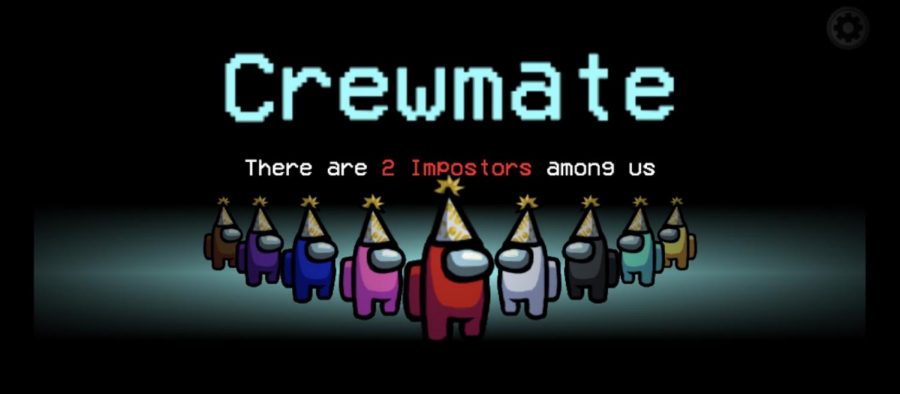A Review of ‘Among Us’ : Like the Card Game ‘Mafia,’ But in a Digital Age
‘Among Us’ players put party hats onto their avatars in order to celebrate a player’s birthday, which highlights the social aspect that accompanies the game.
When I first heard about a game with an impostor who hunts and sabotages other players, I dismissed it as just another violent video game. However, when I saw tiny astronauts on a spaceship doing the same thing, I began to recognize its appeal.
Propelled by social media and through word of mouth, ‘Among Us’ has skyrocketed in popularity over the past few months. In the game, crewmates attempt to keep the spaceship intact, running from room to room to complete their assigned tasks. At the same time, they must be wary that the impostor could be anyone among the four to ten players allowed in a round.
Meanwhile, the impostor’s true intentions are concealed by the fake tasks that they are given. As an added bonus, the impostor has the special ability to go inside vents, moving to different parts of the spaceship swiftly and discreetly. The catch is that getting caught inside a vent would immediately reveal the impostor’s identity. As a quick fix, Haris Khan ’21 said, “When you vent in front of someone, you can just claim that the other player vented.”
It may be hard to believe that a game that revolves around lies and deceit can bring people closer together. “Never have I played a game where friendships are on the line over one round of the game,” said Daiyan Tajwar ’20. This level of intensity seems as if it could tear relationships apart, making us question who we can trust or whether we can trust anyone at all.
However, that is all part of the fun when it comes to playing this game. “Even with my closest friends, it’s hard to tell who is lying,” said Jonathan Pang ’21. The fact that no one truly knows what to expect, even from people we think we know well, adds an element of surprise.
“This deception ironically strengthens the bonds that we have with one another,” said Phoebe Marbid ’21. Suspecting the people we normally would not suspect makes us pay closer attention to their actions, forcing us to be more perceptive.
‘Among Us’ is beginner-friendly, which explains why it has such a large fanbase. “You don’t need any experience with other games of the sort since it’s easy to pick up,” said Christopher Lall ’22. Tanushri Sundaram ’22 shares a similar sentiment. “I’m not big on gaming, but ‘Among Us’ is super fun because of how simple but intense it is.”
Though some enjoy the game for its simplicity, others enjoy it for its potential for complexity. “It might be easy to pick up on, but it’s really hard to master,” said Khan.
It comes as no surprise that the game’s rise in popularity coincides with the need to stay at home during the Coronavirus pandemic. Its multiplayer aspect allows us to engage with others in the comfort of our own homes. “I’ve played over 400 games, and it’s a great way to make new friends,” said Nafisa Zaman ’21.
As if the game does not already have its fair share of unexpected twists, it has also allowed romantic relationships to flourish, not just friendships. “There’s a lot of online dating revolving around the game, which I think is cute and hilarious at the same time,” said Subat Rodoshe ’22. Through the game’s chat feature, players have been able to form strong bonds with one another. (Do remember that it is important to keep private information off the internet for security and privacy).
Whether players choose to play with their friends or with random people on public servers, socially distanced human interaction is present. As a result, other players can truly make or break the game. “A lot of the appeal is the stuff that players bring to the table, like their sense of humor in the chat,” said Giyun Hong ’21.
Many fans of ‘Among Us’ have compared it to ‘Mafia,’ a popular card game that shares similar elements of secrecy, sabotage, and deceit. It is clear, however, that the former is the winner in today’s world. ‘Among Us’ has made its way into people’s phones, computers, and hearts, and it does not seem to be going away anytime soon.
“Even with my closest friends, it’s hard to tell who’s lying,” said Jonathan Pang ’21.
Jaymie Paredes is a Managing Editor/Advisory Editor for ‘The Science Survey.’ Aside from composing articles, she helps to manage deadlines to make...

